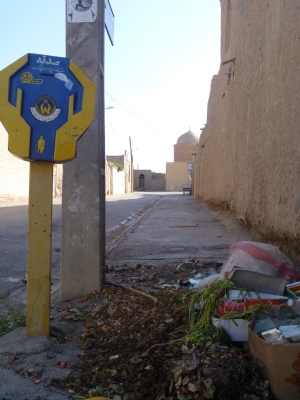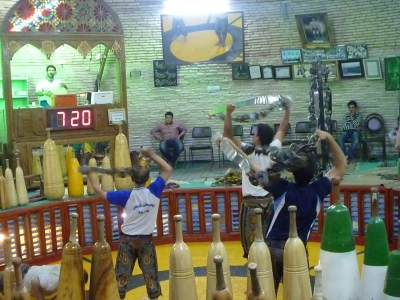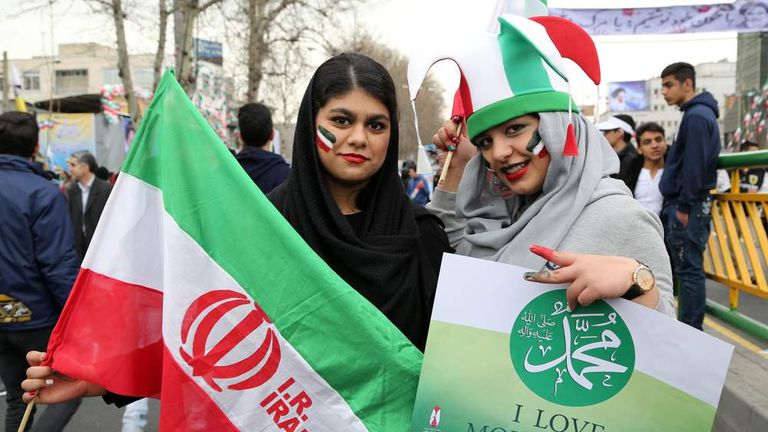Iran’s GDP per capita is $6200 according to the 2011 CIA World Factbook (although it’s likely reduced now since the embargo was intensified). This puts it as the 85th richest per capita out of 191. It’s less rich than Colombia, Botswana and Romania but richer than Bosnia, Ukraine and Indonesia. Obviously, this means that a lot of people are doing it very tough in Iran, especially given that 11.5% of people are unemployed (not the worst rate but not great either).
Based on this, I’d have expected to see beggars. According to our guide, begging is not considered socially acceptable. It’s funny to think how much more unacceptable it might be in Iran, given that it’s not really socially acceptable in any other country and yet more people do it. I only saw one man begging in Isfahan, and he had a severe disability that probably outweighed the stigma. In the short time that I passed, I think 2 people gave to him.
Islam does place a strong emphasis on [Islamic] charity: you’re supposed to give a portion of income to your religious community. This was evidenced by the hundreds of charity boxes that were posted all over the place, including in small alleys and an obscure street corners. While I don’t support religions running charities (especially when it’s based on helping people of the same religion only), their presence and their design were touching. Of course, I don’t know how full they were.

For most people, the economic difficulties may simply mean working very hard. As one man in Isfahan told us, most people work 2 jobs just to make ends meet reasonably. I don’t know if it really is most people but it must be a lot. A lot of people in Western countries might think that Iranian women don’t actively participate in the labour force because of the idea of the subjugation of women. While the state really does repress women, I can assure the reader that at least for the businesses I saw (eg. shops, stores, restaurants), women are very well represented. And given the extremely high percentage of university graduates that are women, I don’t see why this wouldn’t apply to professional work as well. Of course there must also be a lot of male-dominated professions (for instance, I saw almost no women driving so I suspect there are few female bus drivers). But the idea that women aren’t active workforce participants in Iran is ridiculous.
The Islamic revolution in Iran was commited not only to theocratic ideals — their original platform was an almost socialist-level support for the working poor of Iran. For decades, Iran ran the largest fuel subsidy in the world as well as food subsidies. These were heavily reduced in 2011 but I believe some remain. Still, when I was there, the price of petrol was about 10 times cheaper than in Australia today. This is a massive subsidy to locals: foreigners must pay the difference on exit unless special arrangements are made. It’s interesting that the abundance of natural resources gives rise to some dubious tales about how supposedly wasteful people in Central Asia are. The [somewhat dubious] story about Turkmenistan, reported in Lonely Planet is that natural gas is so cheap that people leave stove tops running all day since this is cheaper than buying matches.
The embargo in Iran is very extensive. No Western banks operate there or have ATM agreements with Iranian banks. A transfer might be arranged in an emergency, but this is serious enough to require your consulate to ask. Visa, Mastercard, Amex don’t work either — you just need to bring cash. There is however a large parallel system of Iranian banks, ATMs and all the standard consumer finance. I did see some shops in touristy areas display the Visa logo and say you can pay with a credit card to get a carpet or similar souvenir. I think it must work by the store owner having a relative overseas with a PayPal account. You go online at the store in Iran and pay with your card on PayPal’s site and take the goods. The relative abroad would then have some way of getting the money to Iran (perhaps even by bringing cash during regular visits). The bottom line is the embargo is not complete because such things cannot be complete. People in a country under economic stress will come up with very ingenious solutions. I’ll leave any musings about how useful the embargo is to a long-term renormalisation of relations as an exercise for the reader.
This post has been quite negative but of course commerce in Iran is thriving. It’s on a small scale with tens of thousands of little mom and pop stores selling everything and anything. Often they are collected in covered bazaars: a long corridor that can stretch for a kilometre inside a building with shops on either side. Not only does this protect from the sun but it’s just a






0 Comments